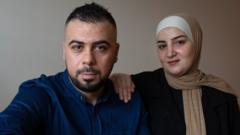In early December, Douna Haj Ahmed, a Syrian refugee living in London, was confronted with the chilling reality of her husband’s past at Al-Khatib prison, a site infamous for its brutal conditions. As coverage of prisoners escaping surfaced in the media following the overthrow of Bashar al-Assad, her husband, Abdullah Al Nofal, revealed painful memories of his detention. "This is where I was arrested," he told her, igniting a flood of emotions that he had long kept buried.
Douna, who had previously only a fragmented understanding of her husband’s experiences, came to see the full extent of his suffering. Describing her husband as someone who strives to maintain a strong exterior, she reflected on the emotional depth of his trauma—an emotional breakthrough that made Abdullah confront his own vulnerabilities. "I saw him weak. I saw him crying," she remarked, emphasizing how these revelations have propelled them to share their story in the hopes that others might understand the suffering endured by Syrians.
Abdullah's ordeal began in July 2013 when he was apprehended by forces at a checkpoint near Damascus while working for the International Committee of the Red Cross. He had initially supported the 2011 anti-regime protests in Deraa, only to distance himself as violence escalated. Following his arrest, Abdullah was placed in solitary confinement, subsequently enduring a harrowing period at Al-Khatib, where torture and inhumane treatment were rampant, as reported by various human rights organizations.
The prison has been linked to the deaths of thousands of detainees, with testimonies from survivors describing horrific abuses, including torture techniques and overcrowding. Abdullah, recounting his time in Al-Khatib, painted a haunting picture of his surroundings, where illness and despair were commonplace. He retold harrowing scenes of fellow inmates, echoing their cries and witnessing the aftermath of brutal interrogations.
Eventually released after a month, Abdullah managed to escape Syria, later moving to the UK with Douna. With the fear of reprisals from the Assad regime fading, Abdullah disclosed the full horrors he had faced, signifying a sense of closure and freedom for both of them. Douna, a committed human rights activist, expressed her grief at hearing her husband’s story for the first time, reflecting on the stark reality of how many individuals remain unheard, their stories buried amid the conflict.
"Every time I feel that this regime has reached the maximum of its capabilities of horror, I discover that there is more," she stated. Their journey of sharing their story speaks to the broader need for acknowledgment and justice regarding the experiences of countless Syrians who have suffered under a long and brutal conflict.
Douna, who had previously only a fragmented understanding of her husband’s experiences, came to see the full extent of his suffering. Describing her husband as someone who strives to maintain a strong exterior, she reflected on the emotional depth of his trauma—an emotional breakthrough that made Abdullah confront his own vulnerabilities. "I saw him weak. I saw him crying," she remarked, emphasizing how these revelations have propelled them to share their story in the hopes that others might understand the suffering endured by Syrians.
Abdullah's ordeal began in July 2013 when he was apprehended by forces at a checkpoint near Damascus while working for the International Committee of the Red Cross. He had initially supported the 2011 anti-regime protests in Deraa, only to distance himself as violence escalated. Following his arrest, Abdullah was placed in solitary confinement, subsequently enduring a harrowing period at Al-Khatib, where torture and inhumane treatment were rampant, as reported by various human rights organizations.
The prison has been linked to the deaths of thousands of detainees, with testimonies from survivors describing horrific abuses, including torture techniques and overcrowding. Abdullah, recounting his time in Al-Khatib, painted a haunting picture of his surroundings, where illness and despair were commonplace. He retold harrowing scenes of fellow inmates, echoing their cries and witnessing the aftermath of brutal interrogations.
Eventually released after a month, Abdullah managed to escape Syria, later moving to the UK with Douna. With the fear of reprisals from the Assad regime fading, Abdullah disclosed the full horrors he had faced, signifying a sense of closure and freedom for both of them. Douna, a committed human rights activist, expressed her grief at hearing her husband’s story for the first time, reflecting on the stark reality of how many individuals remain unheard, their stories buried amid the conflict.
"Every time I feel that this regime has reached the maximum of its capabilities of horror, I discover that there is more," she stated. Their journey of sharing their story speaks to the broader need for acknowledgment and justice regarding the experiences of countless Syrians who have suffered under a long and brutal conflict.


















